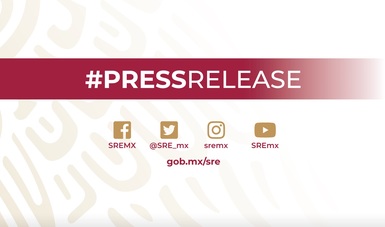The Government of Mexico is noteworthy for its political and diplomatic congruence during the first year of the current administration. From the start, President Andrés Manuel López Obrador said he would focus on the south, protect Mexicans abroad, work for transparent diplomacy and strengthen Mexico's role in human rights and the multilateral agenda.
Over the course of the year, the foreign ministry has coordinated the creation and implementation of the Comprehensive Development Plan, an unprecedented commitment to international cooperation designed to promote the region's equitable and sustainable economic development. Its priority is to develop southern Mexico and the countries of northern Central America in order to make migration an option rather than a necessity.
One of Mexico's foreign policy priorities is the protection of Mexican citizens abroad, with a focus on our diaspora in the United States. Our diplomatic offices abroad have been defending Mexican migrants and their human rights.
The foreign ministry has sought to make its diplomacy transparent, with an unprecedented effort to build a solid and transparent relationship with the legislative branch.
In addition, Mexico plays an international role that allows it to take advantage of two great opportunities: i) to reaffirm its diplomatic leadership on various global challenges and ii) to invite the international community to accompany the government's efforts to boost development and protect human rights in Mexico. Therefore, over the course of this year, Mexico has signed agreements with UNOPS, the UN High Commissioner for Human Rights, UN-Habitat, UN Women and UNESCO.
Mexico has launched a diplomatic strategy to resume its leadership in Latin America, a foreign policy priority. Mexico's role is based on its Constitutional principles and our historical tradition of non-interventionism, as well as on a desire for international dialogue and cooperation.
Based on our relationship with the United States, we have attained a commitment from our northern neighbor to boost economic development in southern Mexico and northern Central America. Both nations have announced a commitment of 4.8 billion dollars for development in southern Mexico and 5.8 billion dollars for northern Central America.
We have promoted an intelligent diversification of our political and economic ties. High-level visits to Europe, Asia-Pacific, Africa, the Middle East, Latin America and North America were made and received. We found specific opportunities for expanding trade and attracting investment, increasing cooperation and working with like-minded countries in the multilateral arena.
The current administration is committed to renewing Mexico's relationship with the world. Key positions have been assigned to members of the diplomatic corps with extensive experience in the various foreign policy areas. A record number of career members of the Mexican Foreign Service have been appointed to head Mexico's diplomatic representations abroad: 114, or 73% of the total.
Negotiations between Mexican and U.S. authorities have avoided tariffs on Mexican steel and aluminum, and Mexico has accompanied its tomato industry in its negotiations to continue the agreement that eliminates compensatory tariffs in that sector. At the same time that these threats have been addressed, progress has been made on the ratification process of the USMCA in the three North American nations.
In June, the Mexican Senate approved the USMCA, a significant step in the process of implementing the trilateral agreement. The USMCA modernizes the topics covered by the previous agreement (NAFTA) in order to adapt to the needs of the economy and trade in the 21st century.
Cultural diplomacy is strengthening Mexico's image around the world, while cultural cooperation with other countries is diversified. The goal is to make culture into an instrument of global governance, cooperation and development for Mexico.
On behalf of the government of Mexico, the Foreign Ministry reaffirms its commitment to base its foreign policy on the principles of human rights, sovereignty, and effective and transparent diplomacy.
